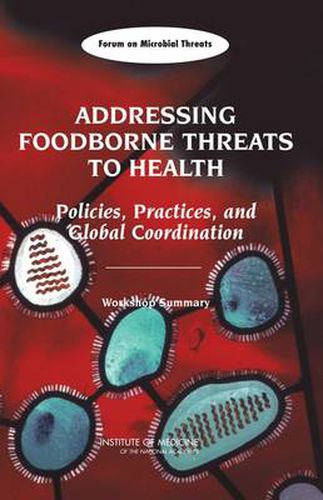Readings Newsletter
Become a Readings Member to make your shopping experience even easier.
Sign in or sign up for free!
You’re not far away from qualifying for FREE standard shipping within Australia
You’ve qualified for FREE standard shipping within Australia
The cart is loading…






In December 2004, at a press conference called to announce his departure as Secretary of the Department of Health and Human Services (HHS), Tommy Thompson raised both concern and controversy when he remarked that he could not understand why the terrorists had not yet attacked our food supply because it is so easy to do. Although to date the United States has been spared such a disaster, the many documented examples of unintentional outbreaks of foodborne disease-some of which have sickened hundreds of thousands of people, and killed hundreds-provide a grim basis for estimating the impact of deliberate food adulteration. Due to the wide variety of potential chemical and biological agents that could be introduced at many vulnerable points along the food supply continuum, contaminating food is considered an especially simple, yet effective, means to threaten large populations. To explore the nature and extent of such threats, possibilities for reducing their impact, and obstacles to this goal, the Forum on Microbial Threats of the Institute of Medicine (IOM) convened the workshop Foodborne Threats to Health: The Policies and Practice of Surveillance, Prevention, Outbreak Investigations, and International Coordination on October 25 and 26, 2005. Workshop participants discussed the threat spectrum and burden of disease associated with foodborne illness and the role that increasing globalization of food production and distribution plays in the transmission of foodborne disease. Participants also reviewed existing research, policies, and practices concerning foodborne threats in order to identify unmet needs, challenges, and opportunities for improving food safety systems, surveillance, and emergency response. Although this workshop summary provides an account of the individual presentations, it also reflects an important aspect of the Forum philosophy. The workshop functions as a dialogue among representatives from different sectors and presents their beliefs on which areas may merit further attention. However, the reader should be aware that the material presented here expresses the views and opinions of the individuals participating in the workshop and not the deliberations of a formally constituted IOM study committee. These proceedings summarize only what participants stated in the workshop and are not intended to be an exhaustive exploration of the subject matter or a representation of consensus evaluation.
$9.00 standard shipping within Australia
FREE standard shipping within Australia for orders over $100.00
Express & International shipping calculated at checkout
In December 2004, at a press conference called to announce his departure as Secretary of the Department of Health and Human Services (HHS), Tommy Thompson raised both concern and controversy when he remarked that he could not understand why the terrorists had not yet attacked our food supply because it is so easy to do. Although to date the United States has been spared such a disaster, the many documented examples of unintentional outbreaks of foodborne disease-some of which have sickened hundreds of thousands of people, and killed hundreds-provide a grim basis for estimating the impact of deliberate food adulteration. Due to the wide variety of potential chemical and biological agents that could be introduced at many vulnerable points along the food supply continuum, contaminating food is considered an especially simple, yet effective, means to threaten large populations. To explore the nature and extent of such threats, possibilities for reducing their impact, and obstacles to this goal, the Forum on Microbial Threats of the Institute of Medicine (IOM) convened the workshop Foodborne Threats to Health: The Policies and Practice of Surveillance, Prevention, Outbreak Investigations, and International Coordination on October 25 and 26, 2005. Workshop participants discussed the threat spectrum and burden of disease associated with foodborne illness and the role that increasing globalization of food production and distribution plays in the transmission of foodborne disease. Participants also reviewed existing research, policies, and practices concerning foodborne threats in order to identify unmet needs, challenges, and opportunities for improving food safety systems, surveillance, and emergency response. Although this workshop summary provides an account of the individual presentations, it also reflects an important aspect of the Forum philosophy. The workshop functions as a dialogue among representatives from different sectors and presents their beliefs on which areas may merit further attention. However, the reader should be aware that the material presented here expresses the views and opinions of the individuals participating in the workshop and not the deliberations of a formally constituted IOM study committee. These proceedings summarize only what participants stated in the workshop and are not intended to be an exhaustive exploration of the subject matter or a representation of consensus evaluation.